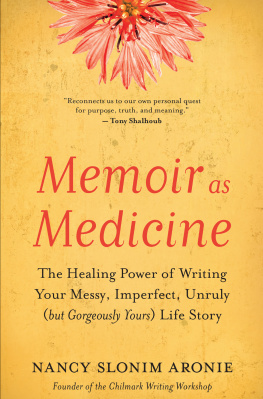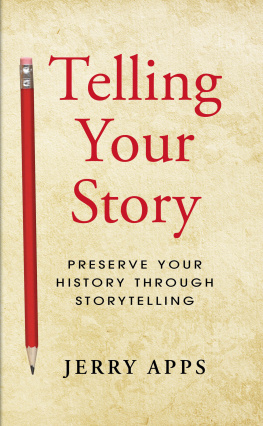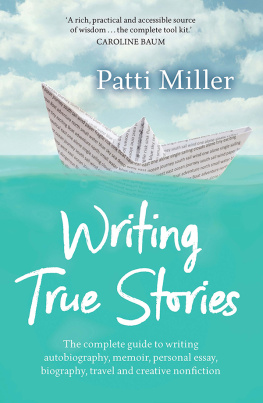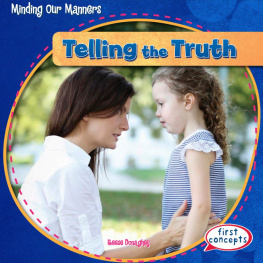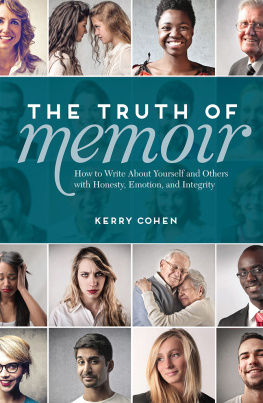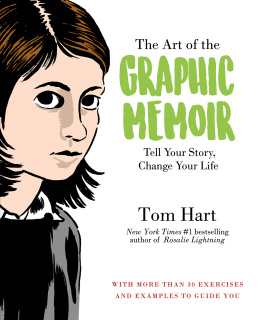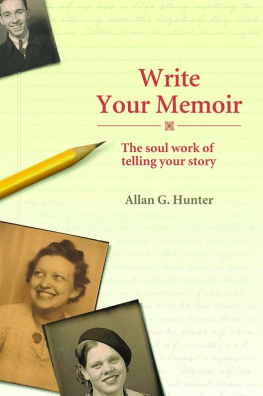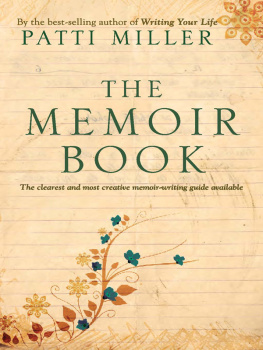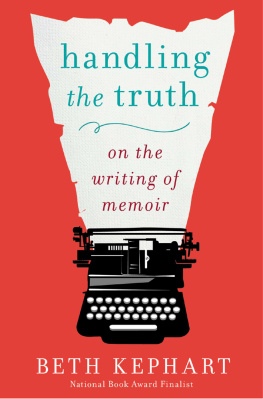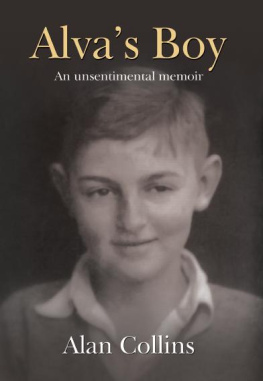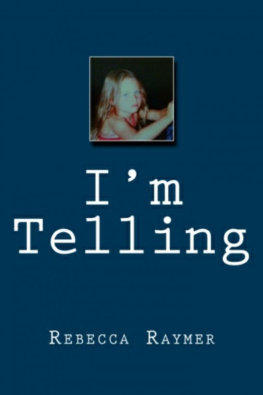Find Your Story, Write Your Memoir
Lynn C. Miller and Lisa Lenard-Cook
THE UNIVERSITY OF WISCONSIN PRESS
The University of Wisconsin Press
1930 Monroe Street, 3rd Floor
Madison, Wisconsin 53711-2059
uwpress.wisc.edu
3 Henrietta Street
London WC2E 8LU England
eurospanbookstore.com
Copyright 2013 by Lynn C. Miller and Lisa Lenard-Cook
All rights reserved. No part of this publication may be reproduced, stored in a retrieval system, or transmitted, in any format or by any means, digital, electronic, mechanical, photocopying, recording, or otherwise, or conveyed via the Internet or a website without written permission of the University of Wisconsin Press, except in the case of brief quotations embedded in critical articles and reviews.
Printed in the United States of America
Library of Congress Cataloging-in-Publication Data
Miller, Lynn, 1951
Find your story, write your memoir / Lynn C. Miller and Lisa Lenard-Cook.
p. cm.
Includes bibliographical references.
ISBN 978-0-299-29314-7 (pbk. : alk. paper)ISBN 978-0-299-29313-0 (e-book)
1. AutobiographyAuthorship. I. Lenard-Cook, Lisa. II. Title.
CT25.M484 2013
808.06'692dc23
2012032685
Excerpts from The Memory Palace: A Memoir by Mira Bartk, copyright 2011 by Mira Bartk, are reprinted by permission of Free Press, a division of Simon & Schuster Inc. Excerpts from The Walk by William deBuys are reprinted by permission of Trinity University Press. Excerpts from The Year of Magical Thinking by Joan Didion, copyright 2005 by Joan Didion, are reprinted by permission of Alfred A. Knopf, a division of Random House, Inc. Excerpts from An American Childhood by Annie Dillard, copyright 1987 by Annie Dillard, are reprinted by permission of HarperCollins Publishers. Excerpts from Heavens Coast: A Memoir by Mark Doty, copyright 1996 by Mark Doty, are reprinted by permission of HarperCollins Publishers. Excerpts from The Situation and the Story: The Art of Personal Narrative by Vivian Gornick, copyright 2001 by Vivian Gornick, are reprinted by permission of Farrar, Straus and Giroux. Excerpts from The Liars Club: A Memoir by Mary Karr, copyright 1995 by Mary Karr, are reprinted by permission of Penguin Group. Excerpts from Oleander, Jacaranda: A Childhood Perceived by Penelope Lively, copyright 1994 by Penelope Lively, are reprinted by permission of HarperCollins Publishers. Excerpts from Searching for Mercy Street: My Journey Back to My Mother, Anne Sexton by Linda Gray Sexton, copyright 1994 by Linda Gray Sexton, are reprinted by permission of the author. Excerpts from Fearless Confessions: A Writers Guide to Memoir by Sue William Silverman, copyright 2009 by Sue William Silverman, are reprinted by permission of the University of Georgia Press. Excerpts from This Boys Life, copyright 1989 by Tobias Wolf, are reprinted by permission of Grove/Atlantic, Inc.
Contents
Preface
What are the ingredients for a memoir that resonates with readers? Its not just storyalthough when someone like Jeanette Walls or Mira Bartk triumphs in the face of a challenging childhood and adolescence, the reader cant help but cheer.
Its not just voicealthough when someone like Tobias Wolff or Mary Karr shares his or her family stories, the reader cant help but empathize.
Nor is it merely the universality of any authors particular storyalthough when Joan Didion examines her first year as a widow, the reader is riveted and grieves along with her.
What keeps us turning the pages of Eat, Pray, Love; Just Kids; Angelas Ashes; and scores of other breakout memoirs is the way each author uses powerful storytelling strategieswhat we call the Fiction Writers Toolkit for memoirto find her or his story.
We come to this book after years of teaching memoir and even more years as fiction writers. While Lisa has written dozens of books of nonfiction and Lynn has worked in autobiographical performance for two decades, our philosophy in Find Your Story, Write Your Memoir is that key word: story.
Our work with students has shown us that while every person has a story to tell, few know, when they first set out, how to uncover its narrative potential or how to unleash its power.
Thats the catalyst behind the Fiction Writers Toolkit, the method that illuminates our theory and practice. In these pages, well illustrate the difference between life events and a dynamic structure and plot that keep the reader glued to the pages or the screen. In this book, well guide you, the author, through the beginning impulse to write your story, what we call the occasion of the telling, on to the dance of memory and experience, through plot, structure, character, landscape, and scene. Along the way, spotlight writing and reading exercises will help you to develop sections of your memoir as you explore the theory and practice weve developed through extensive analysis of both classic and contemporary memoirs and fiction.
We invite you to find your story as we take you through the process.
CHAPTER 1. THE OCCASION OF THE TELLING:
IT BEGINS HERE BECAUSE ITs ABOUT THIS
A memoirs opening pages set up the urgency and risk of telling this particular story at this particular moment. Whether theres a deathbed confession or a Proustian madeleine, something in the present compels the author to revisit the past. In this chapter, we show the writer how she can best answer the question, Why this story now?
CHAPTER 2. THE TWO YOUS: FINDING A PLACE TO STAND
The memoir is told by an author in the present (the remembering self) who takes the reader to various stages of her past (the experiencing self). The journey of this past selfalong with its lessons and conflictsgives the story its tension and informs the author in the present. Because of the dual nature of memoir, the story is a journey of self-discovery not only for the author but for the reader as well. Well also explore the challenges and pleasures of this duality.
CHAPTER 3. BUILDING A NARRATIVE:
LAYING DOWN THE BONES
There are as many ways of constructing a memoir as there are individual stories. This chapter explores the many possible ways of arranging a story, the ways plot and structure intertwine, and provides tools for finding the structure appropriate to the authors particular narrative. Structures explored include chronological, circular, associative, collage, parallel, and locational. In addition, readers will learn the importance of beginning a story with catalyst and conflict and how to map the tension.
CHAPTER 4. ARRANGING THE SCENES:
GIVING THEM MUSCLE
Yes, it really happened, but in order to re-create a scene for readers, authors must be aware of dramatic urgency. Thats why this chapter focuses on scene building. We look at traditional dramatic scenes, how internal scenes can rise in action via conflict and drama, the importance of silence and gaps for the reader to fill, and the use of dialogue as action.
CHAPTER 5. PAINTING THE PICTURE:
LANGUAGE AND SETTING
Plots for memoirs focus not only on the character telling the story but also on the actions of secondary characters, the use of landscape and settingand the seemingly random moments in a life. The telling detail, the dominant image, sustaining metaphors and leitmotifs, and a sense of place provide a layering of the story scaffolding that adds texture and complexity to the memoir.
CHAPTER 6. YOUR STORY, YOUR VOICE: MAKE IT YOUR OWN
Every writer has his own unique style and voice. In the case of the memoir, style and voice inform the story being told as the author views his remembered self with compassion, humor, and even forgiveness. This chapter explores the voices and styles in breakout memoirs and gives writers tools to develop authentic voices of their own.


